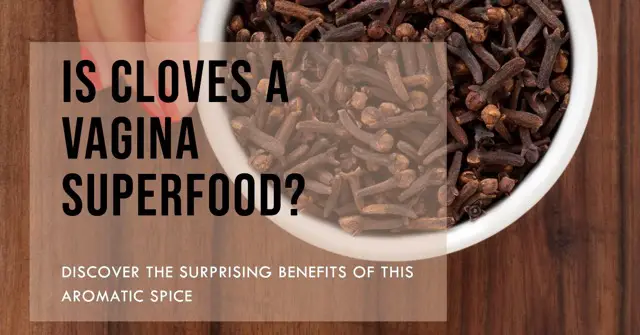Interested in the benefits of cloves to the Virgina (Vagina)?
Then this post is for you.
Because you'll discover everything you need to know about cloves and virginal health and more.
Let's start from the top...

What are Cloves?
Cloves are the dried flower buds from the clove tree used as a spice and in traditional medicine.
- Originally from Indonesia, now grown worldwide
- Used in cooking to add warm, sweet, and spicy flavor
- Known for health benefits like:
- Antioxidants
- Antiseptic properties
Historical uses:
- Ancient Romans and Greeks used cloves for:
- Dental care: Cloves have a natural numbing effect that provided relief from toothaches. Eugenol in cloves has antiseptic properties that supported oral hygiene
- Antiseptic: Treated wounds and prevented infection
- Anti-inflammatory: Provided relief from inflammation and swelling
Modern uses:
- Still used in toothpaste today for fresh breath and cavity prevention
- Used in soaps, perfumes, and skincare for fragrance and cleansing properties
- Widely used in cuisine around the world:
- Used in curries, stews, roasted vegetables
- Used in beverages like mulled wine
- Used in sweets like pumpkin pie and gingerbread
- Potential vaginal health benefits:
- Antimicrobial properties may help vaginal environment
- Anti-inflammatory properties may provide comfort
- More research needed in this area
How Might Cloves Benefit Vaginal Health?
Research specifically on cloves and vaginal health is still emerging. But some key components of cloves may support vaginal wellness:
- Antimicrobial properties:
- The eugenol in cloves has been shown to have antimicrobial effects
- This means it can slow the growth of microorganisms like bacteria and yeast
- Maintaining healthy microorganism levels helps support vaginal health
- Anti-inflammatory properties:
- Eugenol also has natural anti-inflammatory abilities
- Reducing inflammation could help address vaginal discomfort
- Provides soothing effect to irritated tissues
- Antioxidant content:
- Packed with antioxidants like vitamin C and flavonoids
- Antioxidants help strengthen immune system function
- Bolsters the body's ability to fight infection
While these properties show promise, more clinical studies are needed to understand the potential benefits of cloves for vaginal health specifically. Always consult a doctor before trying any new treatments.
Exploring the Potential Advantages of Cloves
Based on their unique qualities, some possible benefits of using cloves for women's health may be:
- Strengthen immune response - Antioxidants help boost immunity which fights infections.
- Promote healthy pH - Vaginal pH is typically 3.5-4.5. This acidity protects against germs. Compounds in cloves could help maintain pH.
- Reduce irritation - Anti-inflammatory properties provide relief and can improve discomfort from infections. Soothes inflamed tissues.
- Enhance antimicrobial protection - Eugenol limits microbial overgrowth to keep yeast and bacteria in check.
- Increase comfort - Numbs and soothes irritated areas. Known for pain relief.
However, human studies are still limited in examining cloves for these precise benefits. More research is needed, so consult a medical professional before using cloves in this way.
Debunking Myths About Using Cloves
There are some common misbeliefs about using cloves for women's health. Let's separate fact from fiction:
Fiction: Cloves can cure all feminine infections and problems.
Truth: The antimicrobial properties of cloves may help prevent certain infections, but cloves can't cure all issues. Serious infections may need antibiotic treatment prescribed by a doctor.
Fiction: More cloves equals better results for feminine health.
Truth: Overusing cloves could actually cause skin irritation, allergic reactions, or sensitivity. Begin with small amounts and stop if discomfort occurs.
Fiction: Cloves work as birth control.
Truth: No scientific proof exists that cloves prevent pregnancy. Don't use cloves instead of doctor-recommended contraception. Talk to your doctor about reliable options.
Fiction: Cloves have zero risks or side effects.
Truth: When used appropriately cloves are generally safe, but allergic reactions, pregnancy complications, and medication interactions are possible. Research thoroughly and consult your doctor before using cloves.
Cloves have benefits but aren't a cure-all. Proper medical guidance is essential!
Considering the Safety of Natural Remedies Like Cloves
While cloves may help some feminine health conditions, it's vital to know the possible risks:
- Allergic reactions - Cloves have compounds like eugenol that could cause allergies in some. Stop use if irritation happens.
- Pregnancy concerns - Large cloves amounts may potentially pose risks during pregnancy. Always ask your OB-GYN before use.
- Medicine interactions - Cloves could interact with blood thinners, antidepressants, etc. Talk to your physician about this.
- Overuse - Using too many cloves could lead to skin irritation, rash, burns. Begin small and increase slowly if needed.
- Quality - Ensure cloves are from a trusted source, not contaminated or weak.
- Not a medical substitute - While cloves may help some issues, they shouldn't replace doctor advice or prescriptions.
Use natural cures like cloves carefully. Your wellbeing comes first!
How to Use Cloves Safely and Responsibly
If you and your doctor determine cloves could be beneficial for your vaginal health, here are some tips for safe and responsible use:
- Speak to your healthcare provider before use, especially if pregnant or on medications
- Test for allergic reactions by applying a small amount of clove oil to skin
- Choose high-quality, organic cloves from a reputable source
- Create a mild infusion by steeping 1-2 cloves in hot water for 5-10 minutes
- Allow infusion to cool to a comfortable temperature before use
- Use a clean applicator like a tampon or dropper to apply infused liquid
- Start with a very small amount and increase slowly if needed
- Limit use to twice per day at most
- Discontinue use if any irritation, burning, or discomfort occurs
- See your doctor if symptoms do not improve or get worse
Remember to listen to your body above all else. Every woman has unique needs, so find what works for you!
Other Natural Options for Vaginal Health
While some women find cloves helpful, they may not be right for everyone. There are many other natural options to support feminine health too:
- Probiotics - Consuming or applying probiotics helps maintain healthy bacteria levels. Look for strains like Lactobacillus.
- Vitamin C - Vitamin C supplements can improve feminine health and elasticity. Stay within recommended daily amounts.
- Stay hydrated - Drinking adequate water supports overall health by maintaining moisture and elasticity.
- Breathable fabrics - Cotton underwear is breathable and prevents excessive moisture that can irritate skin. Avoid silk or synthetics.
- Coconut oil - Has antimicrobial properties. Can be applied externally to soothe irritated tissues. Use sparingly and test for reactions.
- Tea tree oil - Has antifungal effects when diluted in a carrier oil like coconut or almond oil.
- Yogurt - Consuming yogurt with live cultures replenishes healthy bacteria. Look for low sugar varieties.
- Boric acid suppositories - Available OTC and help balance pH levels. Use as directed.
- Diet - Eating yogurt, fruits, vegetables, nuts, seeds and whole grains supports overall health.
Every woman is different. Pay attention to what works best for you! And when in doubt, consult your healthcare provider.
When to See Your Doctor About Vaginal Health
Maintaining vaginal health involves paying attention to your unique body. Be aware of any unusual symptoms and see your doctor if you notice:
- Itching, burning, irritation around the vulva or vagina
- Unusual discharge - thick, clumpy, gray, green, yellow or foul-smelling
- Pain or discomfort during sex or urination
- Rashes, bumps, lesions, swelling around genitals
- Bleeding after sex not related to menstruation
- Frequent urinary tract infections or yeast infections
Vaginal health issues should always be diagnosed by a medical professional. They can determine if cloves or other natural options may help, or if prescription medication is needed. Don't hesitate to see your doctor with any concerns!
Final Thoughts on benefits of cloves to the Virgina (Vagina)
In closing, cloves are an age-old, versatile plant with a variety of potential uses. Their antimicrobial, anti-inflammatory and antioxidant properties show promise for supporting women's wellness. Some find cloves helpful for issues like infections, UTIs, and irritation when used carefully in moderation.
However, cloves have risks like allergies and should not substitute medical care. More research is still needed on their efficacy for women's health specifically. As with any new remedy, discuss with your doctor first. And pay attention to your body's individual needs.
Along with a healthy lifestyle, cloves may be a beneficial addition for some women. But they should be one part of an informed, holistic approach to overall wellbeing. Your health deserves both care and caution as you explore natural solutions.
FAQ About Benefits Of Cloves To The Virgina (Vagina)
Here are some FAQs...
What are cloves?
Cloves are dried flower buds from the clove tree that are used as a natural spice and herbal medicine. They contain compounds like eugenol and antioxidants.
How might cloves help vaginal health?
Some research indicates cloves have antimicrobial and anti-inflammatory properties which could help prevent infections and soothe irritation when used topically. However, more studies are needed.
What are some myths about using cloves vaginally?
Common myths are that cloves can cure all infections, prevent pregnancy, have no risks, or should be used in large amounts. In truth, cloves may provide some benefits but have risks too and should not replace medical treatment.
What are the risks of using cloves?
Potential risks include allergic reactions, pregnancy complications, interactions with medications, overuse, and using poor quality cloves. Cloves should not replace medical advice.
How should you use cloves safely and responsibly?
Use high-quality organic cloves in small amounts. Create a mild infusion and apply topically with a clean applicator, testing for allergy first. Start with small doses. Seek medical guidance before use.
What lifestyle habits support vaginal health?
Eating yogurt, fruits and vegetables, staying hydrated, wearing cotton underwear, taking probiotics, and practicing healthy hygiene habits can help maintain vaginal health.
When should you see a doctor about vaginal health?
See your doctor if you notice irritation, unusual discharge, odor, pain, rashes, lesions, frequent infections or any other bothersome symptoms. Do not self-diagnose or self-treat without professional medical guidance.
Are there alternatives to cloves for vaginal health?
Other natural options include probiotics, vitamin C, boric acid, coconut oil, yogurt, and tea tree oil. However, always discuss natural products with your doctor first.
